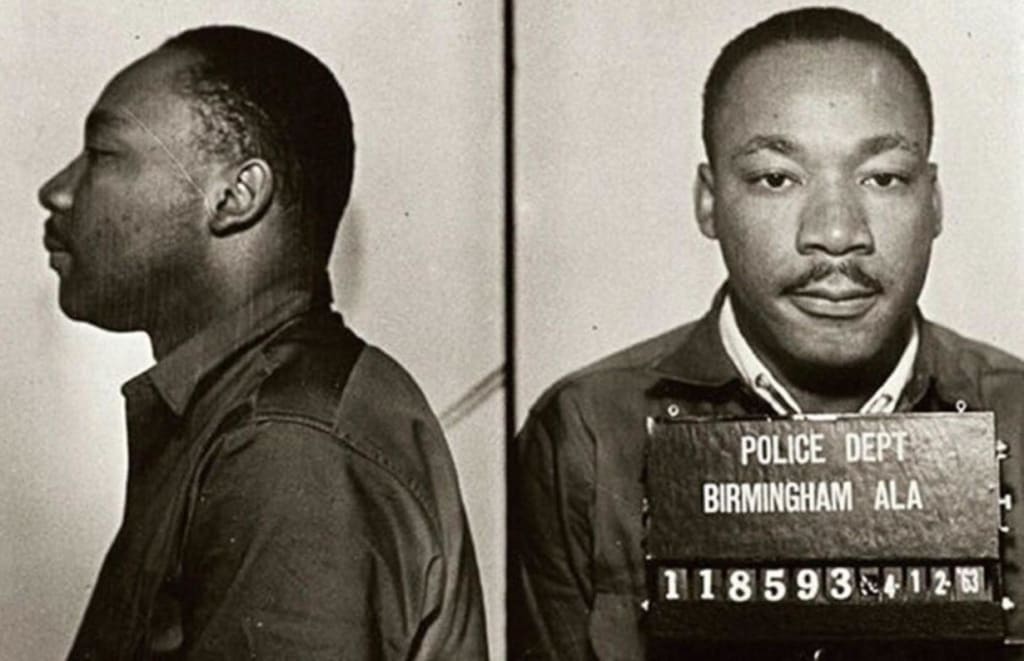Dr Martin Luther King Jr. Reflection:
Would MLK think we had made progress today? Or have we stagnated in our social progress since the 60’s? Why is free speech more valued from certain sects of society more so than others?

I’ll be honest; I’ve been thinking about what to write for weeks; months even.
As soon as the conception of ‘Philosofemme’ came to life and the blog was confirmed – I was thinking. I knew for certain that I wanted to write something poignant about Martin Luther King Jr. and his non-violent philosophy – which is not often considered as part of philosophy, but as political theory. We know him as an activist, but I was interested in his ideology behind his politics. However, I was aware this would be difficult. I wasn’t wrong – it’s been very difficult. How can you write anything new and insightful about the most documented civil rights activist in history? The man is on - a rightfully gained - pedestal; he is the king of love. Despite how loved he is, he is also a man who was murdered in a hate-filled vitriol for fighting for basic human rights for African Americans. This dichotomy and the magnitude of his influence means I feel the pressure writing about him. Especially in the tumultuous civil rights battle that is unfolding across the world - America particularly - around the subject of police brutality towards the Black community. Black Lives Matter campaigners are being silenced, harmed and arrested.
The debates are raging - as they were in the sixties – and there are many questions are being asked:
Is it justified to riot when peaceful action has been ignored, targeted and even demonized? Is it justified to riot against the police? What do we need of modern policing? How can we defund the police? Is it right to protest during a pandemic? What about wearing a mask? What about free speech? What does it mean to hold the government accountable? What is justice? Is this the right time to be protesting? (ask the anti-maskers, who will go on to protest lock downs and so on). When is the time for change? When will it be better? When will society feel more just, fair and safe for those who are the most oppressed? Do we need a leader, a figure head in our current civil rights struggles – or has the internet and community organization made the need for an icon redundant?
With so many questions that are being asked, I’ll admit, I cannot answer them all.
Upon re-reading the texts of MLK that I studied in second year of my philosophy degree, there was a few quotes in particular that I felt were relevant (too relevant almost) to the tumultuous civil rights movement in our present times. I will focus mainly on MLK’s text ‘From Birmingham Jail, (1963)’.
MLK’s Method of Civil Disobedience:
King had a Gandhian based philosophy: he believed African Americans & allies had to peacefully pressure the government for change and make the oppressors bring on this change with love and understanding (ibid, 1987, pp. 26). King’s philosophy depends heavily on the idea of ‘Direct Action’. For him, direct action was the physical embodiment against the problem to propel change in rights and this would be done through mass protest and mass arrest.
On When to Protest:
‘I must confess that over the last few years I have been gravely disappointed in the white moderate. I have almost reached the regrettable conclusion that the Negro’s great stumbling block in the stride towards freedom is not the White Citizens councillor or the Klu-Klux-Klanner, but the white moderate who is more devoted to ‘order’ than to justice: who prefer a negative peace which is the absence of the tension to a positive peace which is the presence of justice: who constantly says ‘I agree with you, in the goal you seek, but I cannot agree with your methods of direct action’, who paternalistically feels that he can set the time-table for another man’s freedom, who lives by the myth of time and who constantly advises the negro to wait until a more convenient season’.
This particular reflection, although the sentiments were expressed in a time different from ours; mirrors the same concern. The ambivalence of the moderate white – who beg that the time is inappropriate to protest. However, when is there ever an appropriate time to treat anybody – never mind a whole race – than less than? Whilst the COVID-19 pandemic navigates through our society, our homes and potentially our lungs; it can feel like nothing else matters. However, this is from an undeserved perch as the disease affects minorities at an exponentially higher level than whites. Those who are white, are men, are straight; whatever position or multitude of privilege we find ourselves to have; if we believe in a just society - we must protest. We have a moral and political obligation if we believe in justice. We Those who complain about protests may not extend the same to anti-mask or freedom marches or Trump rallies. There will always be criticism of those who are protected less by freedom of speech laws.
On The Need For Protest:
Whilst there are several reasons to protest; such as a more just society, civil rights progression, to show disdain for government policy to form community; MLK’s reasons are these and also: Oppressors rarely give up their rights voluntarily. We must be examples of this. If we fall into the group of the oppressors or the privileged; we must show that we are willing to give up our privilege voluntarily and set the example for others.
‘My friends, I must say to you that we have not made a single gain in civil rights without determined legal & non-violent pressure. History is the long and tragic story of the fact that privileged groups seldom give up their privileges voluntarily. Individuals may see the moral light & voluntarily give up their unjust postures: but as Reinhold Webihr has reminded us, groups are more immoral than individuals’.
Whilst the Letter from Birmingham Jail is relevant in the case of BLM protests during the pandemic due to police violence; I found the two above quotes particularly fitting. How the moderate timetables the freedom of others is enforcing oppression – in a nearly as dangerous in fashion for MLK than a white-supremacist– as they embolden the latter. His ‘direct action’ is almost meditative, and how we can show the contradiction of an unjust government by being peaceful. To see someone protest (which is a human right), yet face police violence should spark outrage, as it is a seemingly incomprehensible contradiction. The unprovoked direct-actioner, against the violent state. The collective aspect of MLK’s ideology, his reasoning that groups are more immoral can extend to police violence in our present time. We allow mob mentality to justify immorality. This is how police violence has been excused, ignored and justified. In the US, where the death penalty is still acceptable – there is an acceptance of violence or death as punishment. Police – as a hierarchical structure - have had the power to be the judge, jury and executioner. Society always rebels against the tyrants.
On Violent Protests:
‘If his oppressed emotions do not come-out in these non-violent ways: they will come out in ominous expressions of violence’.
If one cannot protest peacefully, vote, or have any form political voice; the discontent will be expressed violently; especially if the peaceful action is met with violence. If one is censored, they will become violent to express these views. However, I think this is an interesting point about free speech. When a group has been oppressed, their speech is typically ignored – or ‘censored’, thus, when rebellion strikes – the media suggests them as the violent wrong-doers who had the option to protest. The reality is those who are protesting are often ignored or excluded from public debates public spaces and are then punished for the physical collection of contempt. When the peaceful protest; there is often violence from the police – further censoring speech and inciting further violence. Whilst MLK would reject that we can respond with violence, this quote highlights here that he understands why people cannot choose self-suffering in the means of direct action if it feels reductive.
Those with the most structural power, have the most structural protection of ‘free speech’ – yet are often the ones who worry that with others making a more inclusive space, feel infringed on – as if their free speech wasn’t silencing or infringing the rights of those oppressed.
Whilst I do not believe that we need one, idol-esque figure to act as a spokesperson in regard to the cause; I do believe it helps. A figurehead for an issue can aid in galvanising public. Whilst Black Lives Matters is very much grassroot and community organised (like the group); MLK began to represent a pacifist and Christian philosophy; it gave the government someone to answer to. His authority and presence meant they could not see the cause as anonymous citizens and meant they had to be more accountable. This of course is the wrong way to treat the public; but this is what is happening now and has happened historically. Whilst on that note; the internet also means we have somewhat eradicated for the need of a figure head. The internet allows many of us to organise and connect in amazing ways that were not possible in the time of King. The anonymity (which has been encouraged as to protect oneself) also has its benefits. It shows; it doesn’t matter about who we are; but that you listen anyway. It also has lent itself for many community leaders to take importance and lead the movement; all over a much more collective protest generally. We must add; that King was not the only activist of his time; but he represented a palatable activism, which was pacifist. There was also Malcom X who did not share this sentiment – which King understands why. It is understandable; if one continues to be censored and ignored, violent expression will erupt. It is only to be expected.
Black Lives Matter protests are largely peaceful, but there are individual philosophies at work here. One may peacefully protest until provoked; one may be a pacifist in the way king is/ One may be violent regardless. We are much more politically varied than in the 60’s; which may also explain why we do not have one or two specific leaders; but many influencers. This is just me hypothesizing of course. Regardless, we have a lot to thank of Martin Luther King for his activist and philosophical methods. He continues to be a hero and influencer to many of us in the present.
Black Lives Always Matter.
About the Creator
Philosofemme.
We exist to widen relevant philosophical discussions to make them radically inclusive, diverse and accessible to all. For too long; philosophy has been unapproachable and gate-kept by an academic elite.
https://www.philosofemme.blog/






Comments
There are no comments for this story
Be the first to respond and start the conversation.